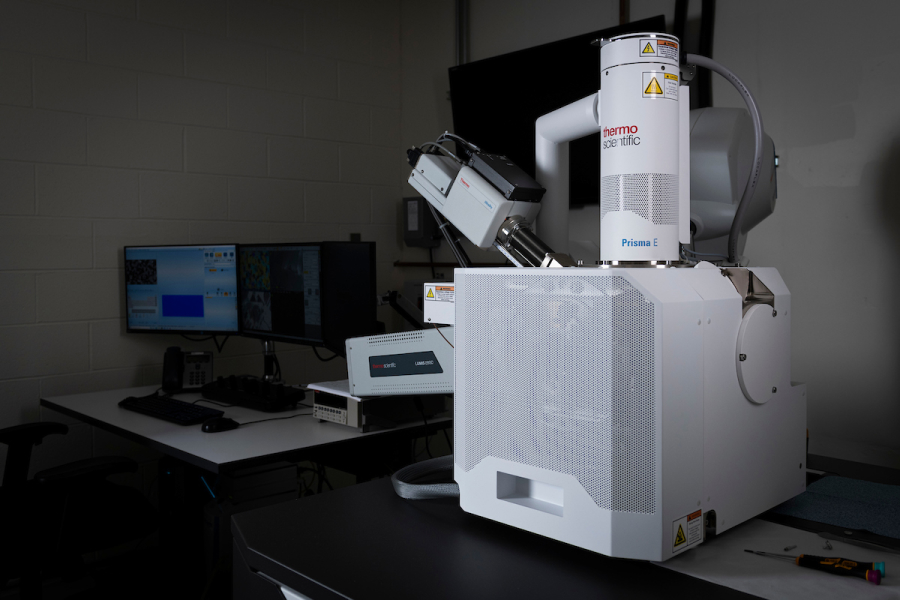General Information
The Materials Science and Engineering (MSE) Department at Missouri S&T offers an on-campus, non-thesis Master of Science program in Materials Science and Engineering designed for professionals seeking advanced expertise without the commitment of a research thesis. This flexible program is ideal for students with a background in materials science, ceramic engineering, glass, biomaterials, or metallurgical engineering, as well as related fields such as chemistry, physics, and chemical engineering.
The program focuses on practical knowledge and advanced coursework in areas like extractive metallurgy, physical metallurgy, mechanical metallurgy, metal casting, steel making, advanced metallic materials, ceramics, glasses, refractories, composites, and biomaterials.
With growing global demand for materials expertise in industries such as critical materials, steel making, high-performance alloys, advanced manufacturing, aerospace, hypersonics, biomaterials, and energy materials, this program equips graduates with the skills to excel in competitive fields.
Learn more about this career-focused program at mse.mst.edu.
Admission Requirements
- The requirement for entry into one of these programs includes a baccalaureate degree in materials science or engineering, ceramic engineering or science, glass science or technology, or metallurgical science or engineering. A baccalaureate degree in physics, chemistry, chemical engineering, mechanical engineering, or related discipline may also be acceptable.
- GPA: Minimum undergraduate GPA 3.2
- GRE: Verbal + Quantitative 302, Analytical Writing 3.5
- Transcripts: Official transcripts required
- English proficiency test score requirements: TOEFL 85, IELTS 6.5, PTE 58, Duolingo 115
- Other requirements: Resume/CV, Statement of Purpose, two recommendation letters
Program Requirements
- Complete at least 30 total credit hours of lecture courses
- Complete at least 18 credit hours in the MSE department
- Complete at least 9 credit hours of 6xxx lecture courses; two of these courses must be MS&E 6120 (Thermodynamics and Phase Equilibria) and MS&E 6130 (Kinetic Theory for Materials)
- Complete at least 18 credit hours of 6xxx and 5xxx lecture courses combined
List of Core Courses (6 credit hours)
- MS&E 6120: Thermodynamics and Phase Equilibria (3 credit hours, offered every spring)
- MS&E 6130: Kinetic Theory for Materials (3 credit hours, offered every spring)
List of Elective Courses (24 credit hours)
Courses in the Materials Science and Engineering Department
- MS&E 5060: Chemistry of Construction Materials (3 hours lecture, offered every spring)
- MS&E 5220: Advanced Phase Equilibria (3 hours lecture, offered every fall)
- MS&E 5230: Energy Materials (3 hours lecture, offered every spring)
- MS&E 5310: Biomaterials I (3 hours lecture, offered every fall)
- MS&E 5810: Introduction to Polymeric Materials (3 hours lecture, offered every fall)
- MS&E 5819: Polymer Synthesis and Characterization Lab (1 hour lab, offered every fall)
- MS&E 5850: Introduction to Coating Chemistry (3 hours lecture, offered every spring)
- MS&E 6060: Advanced Chemistry of Construction Materials (3 hours lecture, offered every spring)
- MS&E 6110: Bonding, Crystallography, and Structure-Property Relationships (3 hours lecture, offered every fall)
- MS&E 6140: Communication in Materials Science and Engineering (3 hours lecture, offered every fall)
- MS&E 6220: Advanced Energy Materials (3 hours lecture, offered every spring)
- MET ENG 5150: Introduction to Metal Additive Manufacturing (3 hours lecture, offered every spring)
- MET ENG 5170: Nuclear Materials I (3 hours lecture, offered every fall)
- MET ENG 5270: Mineral Processing II (Mechanics and Design) (1 hour lab, 2 hours lecture, offered every spring)
- MET ENG 5130: Corrosion and Its Prevention (3 hours lecture, offered every spring)
- MET ENG 5420: Advanced Metals Casting (3 hours lecture, offered every fall)
- MET ENG 5425: Metals Casting Laboratory (1 hour lab, offered every fall)
- MET ENG 5450: Advanced Steelmaking (3 hours lecture, offered odd years, fall semester)
- MET ENG 5480: Refining of Metals (3 hours lecture, offered odd years, fall semester)
- MET ENG 5510: Nondestructive Testing (3 hours lecture, offered odd years, spring semester)
- MET ENG 5520: Electron Microscopy (3 hours lecture, offered every semester)
- MET ENG 5630: Environmental Aspects of Metals and Engineering (3 hours lecture, offered odd years, spring semester)
- MET ENG 5810: Principles of Engineering Materials (3 hours lecture, offered every fall)
- MET ENG 6320: Advanced Steels and Their Treatment (3 hours lecture, offered even years, fall semester)
- CER ENG 5230: Glass Science and Engineering (3 hours lecture, offered every fall)
- CER ENG 5250: Refractories (3 hours lecture, offered every spring)
- CER ENG 5310: Advanced Ceramic Processing (3 hours lecture, offered every spring
- CER ENG 6410: Advanced Integrated Computational Materials Engineering (1 hour lab, 2 hours lecture, offered every fall)
12 credit hours of lecture courses out of the MSE department can be taken with the advisor approval.
Course Availability
A full list of course availability and timing can be found here: https://cec.mst.edu/academics/course-availability/
Please note: During the semester a student will have completed nine hours of graduate credit, the student must formally plan the remainder of their graduate program in consultation with their academic advisor, and submit a Form 1 for approval, first to the department chair and then to the vice provost of graduate education

.jpg)

Follow Materials Science and Engineering